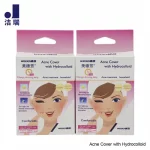HouseHold Solution for Acne Day and Night use hydrocolloid patches gently absorb excess fluids, like pus and oil, from your popped pimple while also protecting your ~wound~ from bacteria, gunk, and your dirty little fingers. They help skin heal from the inside out in a moist environment, like the way it’s supposed to,” she adds.
How to use:
- Gently clean and dry the wound with pure water or saline.
- Remove the hydrocolloid from the release paper and apply it onto wound.
- Smooth out wrinkles.
- Hydrocolloid will expand and bleach after absorbing the wound exudates, and will reach to saturation point after 24 hours
- Remove the hydrocolloid when exudates overflow, and replace a new one.
- While removing, press one side and lift up the other side.



























Reviews
There are no reviews yet.